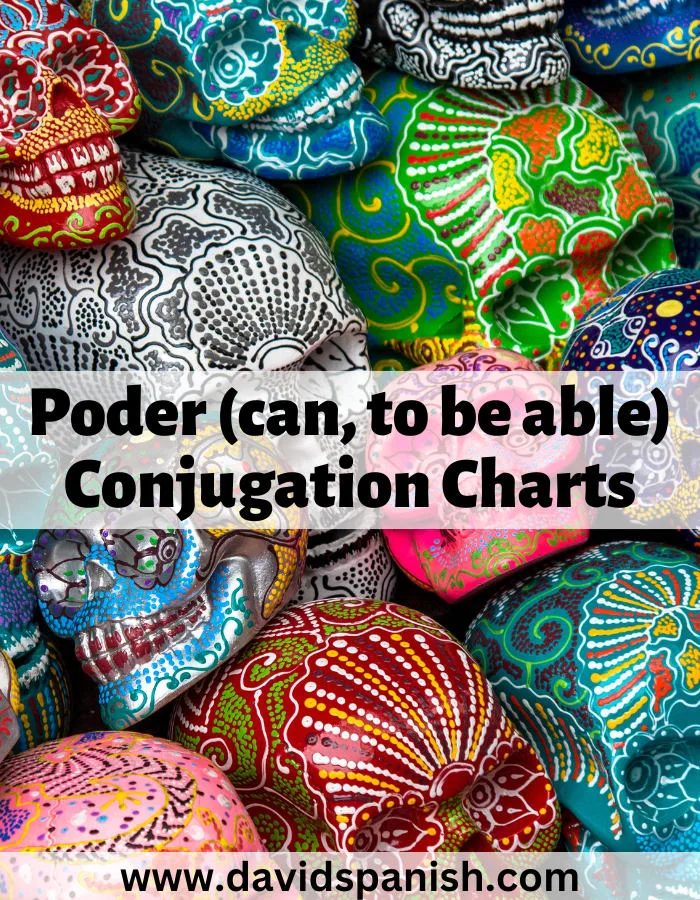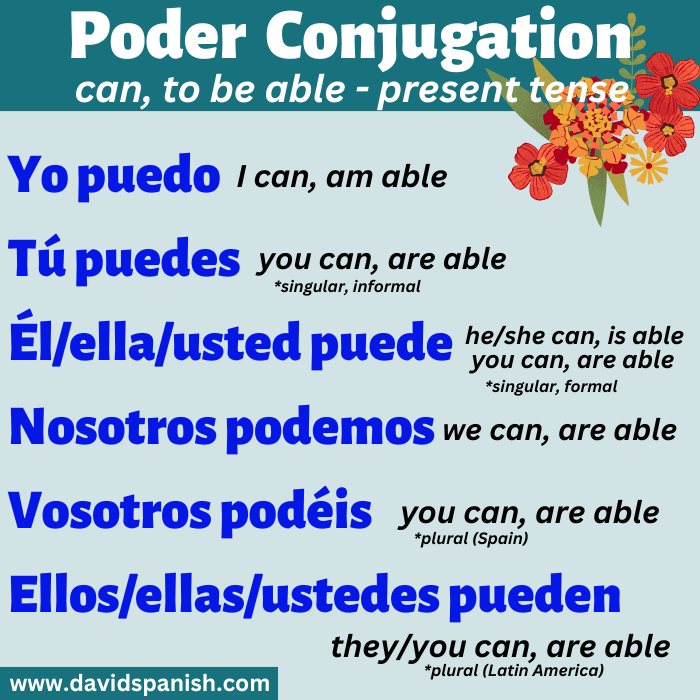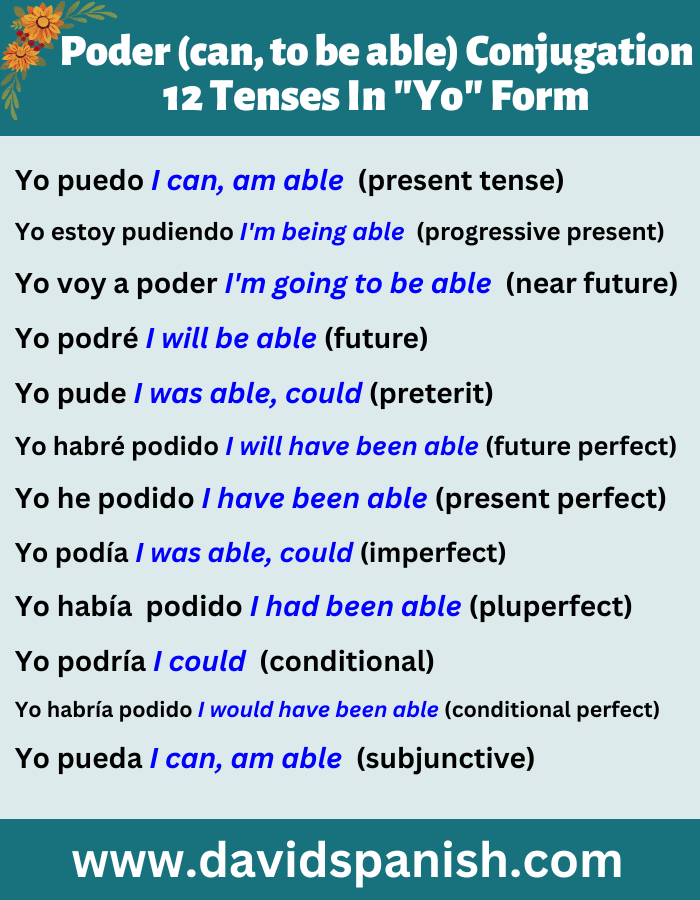Poder (Meaning: Can, to be able to) is an essential Spanish verb. The conjugation of poder in the present tense is: Yo puedo (I can, am able), tú puedes (you can, are able), él/ella/usted puede (he/she can, is able; you can, are able), nosotros podemos (we can, are able), vosotros podéis (you can, are able) and ellos/ellas/ustedes pueden (they/you can, are able).

Poder is an irregular ER verb. While its endings when conjugated in the preset tense are the same as other regular ER verb, it has an irregular stem. This page our site explains regular and irregular Spanish ER verbs in detail.

Further down this page we provide conjugation tables with example sentences for poder for the following commonly used tenses:
- Present tense (presente de indicativo)
- Near future tense (futuro proximo)
- Future tense (futuro)
- Preterite (préterito)
- Present perfect indicative (perfecto de indicativo)
- Imperfect (imperfecto de indicativo)
- Conditional (potencial simple)
- Present subjunctive (presente de subjuntivo)
Poder conjugation table

Poder: twelve verb tenses in the “yo” form
The following graphic provides the forms for the first-person singular (yo) of poder in 12 verb tenses.

Poder conjugation charts
Present tense (el presente de indicativo)
In the present tense, yo puedo translates to “I can” and “I am able to”.
| yo puedo | I can, am able | Yo puedo hacer muchas cosas. | I can do a lot of things. |
| tú puedes | you can, are able | Tú puedes hablar español. | You can speak Spanish. |
| él/ella, usted puede | he/she/you can; he/she is able, you are able | Ella no puede venir esta noche. | She isn't able to come tonight. |
| nosotros podemos | we can, are able | Nosotros podemos ir a la fiesta. | We can go to the party. |
| vosotros podéis | you can, are able | Vosotros podéis cocinar la paella. | You can cook the paella. |
| ellos/ellas, ustedes pueden | they/you can, are able | Ellos pueden ayudarnos. | They area able to help us. |
Near future tense (futuro proximo)
The near future tense is formed with the following construction: Ir (to go) conjugated in the present tense + preposition a + infinitive. Yo voy a poder translates to “I’m going to be able”.
| yo voy a poder | I am going to be able | Voy a poder viajer a Colombia. | I'm going to be able to travel to Colombia. |
| tú vas a poder | you are going to be able | Vas a poder comprar el coche. | You're going to be able to buy the car. |
| él/ella, usted va a poder | he/she/you is (are) going to be able | Él va a poder trabajar aquí. | He's going to be able to work here. |
| nosotros vamos a poder | we are going to be able | Vamos a poder viver a Madrid | We're going to be able to live in Madrid. |
| vosotros vais a poder | you will be able | Vais a poder alquilar el piso. | You're going to be able to rent the apartment. |
| ellos/ellas, ustedes van a poder | you/they are going to be able | Ellos van a poder conseguir las visas. | They're going to be able to get the visas. |
Future tense (futuro)
In the future tense, yo podré translates to “I will be able”.
| yo podré | I will be able | Yo podré ayudarte. | I'll be able to help you. |
| tú podrás | you will be able | ¿Podrás venir a la fiesta? | Will you be able to come to the party? |
| él/ella, usted podrá | he/she/you will be able | Él podrá solucionar el problema. | He'll be able to solve the problem. |
| nosotros podremos | we will be able | Nosotros podremos analizar la situación. | We'll be able to analyze the situation. |
| vosotros podréis | you will be able | Vosotros podréis pedir disculpas. | You'll be able to apologize. |
| ellos/ellas, ustedes podrán | they/you will be able | Ellos podrán disfrutar de su jubilación. | They'll be able to enjoy their retirement. |
Preterite (préterito)
The preterite tense is used to express completed actions in the past. Yo pude translates to “I was able” and “I could”.
| yo pude | I was able, could | No pude traducir el documento. | I wasn't able to translate the document. |
| tú pudiste | you were able, could | Tú pudiste comprar el televisor. | You were able to buy the TV. |
| él/ella, usted pudo | he/she/you was (were) able, could | Él pudo encontrar un coche nuevo. | He was able to find a new car. |
| nosotros pudimos | we were able, could | Nosotros pudimos irnos de vacaciones. | We could go on vacation. |
| vosotros pudisteis | you were able, could | No pudisteis trabajar el fin de semana. | You couldn't work on the weeknds. |
| ellos/ellas, ustedes pudieron | they/you were able, could | Ellos pudieron disfrutar de su tiempo en Argentina. | They were able to enjoy their time in Argentina. |
Past indefinite (perfect de indicativo)
The past indefinite tense is used to express past actions which may be on going and have a bearing on the present. Yo he podido translates to “I have been able”.
| yo he podido | I have been able | No he podido contactarlo. | I haven't been able to contact him. |
| tú has podido | you have been able | Has podido resolver tus broncas. | You've been able to resolve your problems. |
| él/ella, usted ha podido | he/she/you has (have) been able | Todavía no ha podido encontrar una novia. | He still hasn't been able to find a girlfriend. |
| nosotros hemos podido | we have been able | Hemos podido disfrutar de los paisajes de este país. | We've been able to enjoy the beautiful scenery of this country. |
| vosotros habéis podido | you have been able | Habéis podido ganar dinero fácilmente. | You've been able to earn money easily. |
| ellos/ellas, ustedes han podido | they/you have been able | Han podido aprender todos los verbos. | They've been able to learn all the verbs. |
Imperfect (imperfecto de indicativo)
The imperfect tense is used to express ongoing actions which used to occur in the past. Yo podía translates to “I used to be able to”, “I was able to” and “I could”.
| yo podía | I was/used to be able, could | Cuando era niño, no podía hablar español. | When I was a child I couldn't speak Spanish. |
| tú podías | you were/used to be able, could | Cuando era estudiante podías estudiar durante mucho tiempo. | When you were a student you could study for a long time. |
| él/ella, usted podía | he/she/you was (were)/used to be able, could | Ella nunca podía ser buena en matemáticas. | She could never be good at math. |
| nosotros podíamos | we were/used to be able, could | Cuando éramos jovenes podíamos correr rápidamente. | When we were young we could run fast. |
| vosotros podíais | you were/used to be able, could | Cuando estabais a Madrid podíais entender casi todo. | When you were in Madrid you could understand almost everything. |
| ellos/ellas, ustedes podían | they/you were/used to be able, could | Cuando eran adolescente no podían salir sin pedir permiso. | When they were teenagers they couldn't go out without asking permission. |
Conditional (potencial simple)
The conditional tense is used to express hypothetical situations. Yo podría translates to “I could”. Poder in the conditional is also used to make polite requests.
| yo podría | I could | Yo podría vender mi departemento pero quiero quedarme aquí. | I could sell my apartment but I want to say here. |
| tú podrías | you could | ¿Podrías ayudarme, por favor? | Could you help me, please? |
| él/ella, usted podría | he/she/you could | ¿Podría decirme por qué está estudiando español? | Could you tell me why you're studying Spanish? |
| nosotros podríamos | we could | Nosotros podríamos visitar Paris pero preferimos Monaco. | We could visit Paris but we prefer Monaco. |
| vosotros podríais | you could | Podríais darnos el caviar y las langostas, por favor. | Could you please give us the caviar and lobsters. |
| ellos/ellas, ustedes podrían | you/they could | Podrían pedir una botella de vino pero prefieren la champaña. | They could order a bottle of wine but they prefer champagne. |
Present subjunctive (presente de subjuntivo)
In Spanish, the subjunctive mood is used to express wishes, emotions and doubts. Yo pueda translates to “I can” and “I am able”.
| yo pueda | I can, am able | Piensa que no pueda ayudarles. | He thinks I can't help them. |
| tú puedas | you can, are able | ¿Es verdad que no puedas venir? | Is it true that you can't come? |
| él/ella, usted pueda | he/she/you can, is (are) able | No es cierto que no pueda hacer nada. | It's not true that he can't do anything. |
| nosotros podamos | we can, are able | Quiere que podamos hacer el pastel. | He wants us to be able to make the cake. |
| vosotros podáis | you can, are able | Es dudoso que podáis participar esta noche. | It's doubtful that you can participate tonight. |
| ellos/ellas, ustedes puedan | they/you can, are able | No pienso que puedan asistsir a la reunión. | I don't think they can attend the meeting. |
Discover more:
- Ser vs. estar – beginners guide
- Ser (to be) conjugation charts
- Estar (to be) conjugation charts
- Hablar (to speak) conjugation charts
- La Bamba Meaning, Spanish Lyrics & English Translation - May 4, 2024
- Bésame Mucho Meaning, Spanish Lyrics & English Translation - May 3, 2024
- Querida – Lyrics, Meaning & Translation - May 2, 2024
